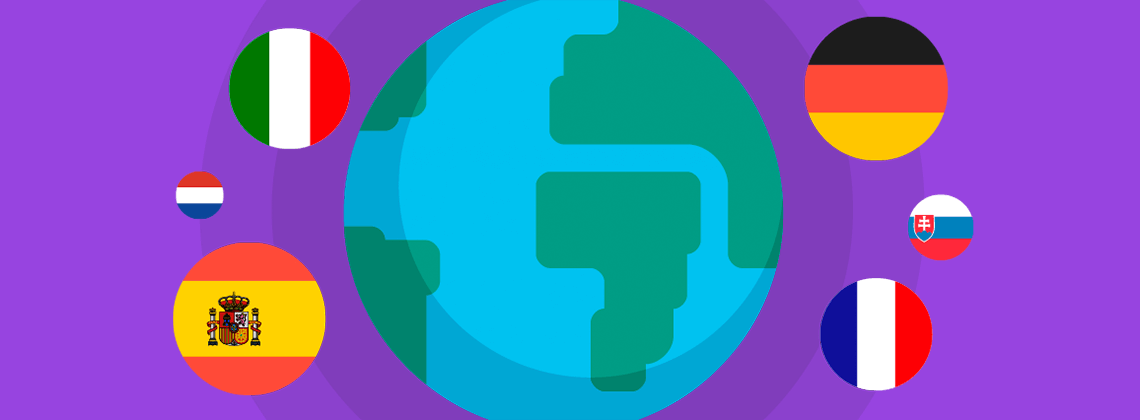

If you’ve ever wanted to choose a weird and wacky language, now’s the time.
The world has over 7,000 different languages. A lot of these are dialects and variants of a popular language, but the choice is there, all of them are registered and have names. If you’re looking for a fun language to learn, there are many to choose from.
Exploring new languages can open up many opportunities for you that offer you even more “fun” and enjoyable experiences. While learning there is lots of fun to have, languages are beautiful things once you embrace them and can provide you with a lot of experience and potential once acquired.
What makes a language fun?
There are many elements of learning which make acquiring a language fun. Many people say it’s the company you are with, speaking a language with others can make languages absorbing, adding elements of social interaction, humor, and freedom.

Others find value in other methods to make learning fun; they include:
- Using online resources
- Speaking to native speakers
- Making flashcards
- Being taught in a classroom (evening classes)
- Traveling to the native speaking country
Selecting a “fun language” takes some time and research. Sometimes a fun style is determined by your reaction to the learning. The process is a valuable experience when it comes to acquiring a new language; you need to enjoy it. Enjoying the process of picking up a language is so useful. That’s why motivation and purpose are vital to your education; it’ll keep you progressing when everything gets tough.
Your language choices
To save you some time, we’ve taken some time to pick out some of the exciting languages which you could start with today. As we mentioned, there are hundreds of languages within your realm of learning, but you want to make sure you pick the right one.

Here are our recommendations for languages:
- Spanish
Spanish has over 400 million native speakers offering you a whole world of speakers to engage with. Spanish is one of the most popular choices thanks to its host of resources. Whether you are learning using Dora the Explorer or textbooks, the learning is very open and fun. Thanks to the European/Romance language association Spanish has a good flow to its vocabulary allowing it to become highly addictive amongst speakers.
- Japanese
Japanese is similar to Chinese in its style, a character based and interactive in its approach style. Japanese allows learners to get involved with drawing and is supported by a lot of pop culture fueled by TV and magazines made famous by the Japanese. Japanese television and movies like My Neighbour Totoro and Spirited Away have inspired many recent generations to learn new languages, as well as YouTubers who speak in Japanese or ones that are native to Japan that has influenced their followers/community into trying out Japanese.
- Sign Language
You assume languages are spoken with the voice, but many find some value learning a hand-based like sign language. Sign has many different variations like ASL and BSL, being options in English. Sign language has become enjoyable for many as they learn to. Sometimes the language can be amusing to learn due to its hand gestures, this is more interactive for many learners, and makes for some fun activities. Sign language is also influenced by whether someone that you know or care for needs these skills to communicate, allowing it to have a mandatory approach, nonetheless, it’s still a fun language to acquire.
- Italian
The romance language, Italian is chosen on many occasions. Many people listen to the language by overhearing it and fall in love. Italian is a fluid language, with an attractive set of vocabulary and a strong culture. With Italy being a popular holiday destination, many people enjoying learning Italian thanks to it’s fun and upbeat range of phrases, vocabulary, and fluency. Many people love watching films like Life is Beautiful, or Cinema Paradiso – both Italian classics that have inspired many to adopt the language. This inspirtation is enough to fuel others with their learning.
- Chinese

Many people gain benefit when learning Chinese; they find value in the difficulty and challenge of the picture based language. Chinese has been the most spoken language around the globe for many years, popular with travelers and those looking to acquire a strong language. Chinese needs persistence, but it’s followers tend to be hardcore language learners, reinforcing it as an ever growing hobby.
- English
English is very popular around the world for its language. English is widely spoken, with over 1 billion native speakers across the UK, America, Australia and many other countries. English has a fanbase with its wide range of vocabulary, made known through media such as movies and TV that is available in countries around the globe. Many people appreciate English can be hard for non-English speakers as they transition to living in the UK due to the pressure of acquiring the language.
- German
For those language learners out there, German has been very popular with those who are looking for a European style without the natural romance language fluency. German is very different in its grammar and structure, allowing it to be more stubborn in its pronunciation, practice, and fluency. Learning German can, again, be very rewarding for those who take it up and also very humorous when it comes to pronunciation.

Enjoying the process of learning is so useful. That’s why motivation and purpose are vital to your learning; it’ll keep you progressing when the learning gets tough. When it comes to a decision, take some time to research the language and make sure you are happy with your choice. Before committing to learning the language, spend a full week testing out the language, researching the uses and discovering the cultural elements.
Is English is a fun language?
English is regarded as a tough language to learn by many non-English speakers.
So, does that make it a tricky to learn? Or even take the fun out of it? Yes and no. A lot of the time, it depends on the person who’s studying, if you’re motivated by the language, you tend to be able to find new routines and activities to make the learning fun, however, if you’re learning English as a hobby it’s a lot easier, as there is less pressure to learn with speed, making the experience more enjoyable. With languages, it depends on what type of person you are, languages learnt with speed can help people, whereas languages learn over time is something that many people prefer due to its care-free approach.
With languages, it depends on what type of person you are, languages learnt with speed can help people, whereas languages learn over time is something that many people prefer due to its care-free approach.

Most of the time, people are learning English out of necessity, so sometimes the fun is removed due to the pressure of having to acquire the language over a short period, this might be needed for work, for citizenship, for being able to mingle with colleagues or friends, etc. All of these put pressure on the speaker, potentially making
For those who aren’t finding English tricky and not finding much fun from learning the language, we recommend trying a new approach. Maybe you use a new resource that you haven’t before, or maybe you join an online class that helps you to socially interact with a native speaker. The fun part of learning
How can I start learning a language using a fun method?

There are many different ways to start learning a language. For those looking to add the fun in from day one, make sure to take some of these advice points and use them from the start to help keep the momentum. Here are a few suggestions for learning a language interactive and in a fun way:
- Learn using Flashcards – they’ll contribute to support you daily learning, test yourself every single evening.
- Learn using an iPhone or Android app – a great way to learn languages on your phone. It’s not only possible, but it’s very fun, there’s plenty of options, games, lessons, and features for learning with an app, so, why not try learning some of the target languages digitally, try using FlashAcademy® today.
- Learn with native speakers – speaking to a native can be one of the most productive ways to learn languages.
- Try travelling to a native speaking country – many people get so much value when they head to the destination where people speak it, there’s much fun from this, not just the holiday part, but the immersion, being put in a difficult situation and having to acquire new vocabulary, new words, and explore new opportunities.
There are many benefits to starting a language today, it’s up to you whether you make it fun, there are plenty of resources and influencers in the language learning space that can make it interesting for you to learn, so why not try discovering that today and add a little spice to your language learning.

